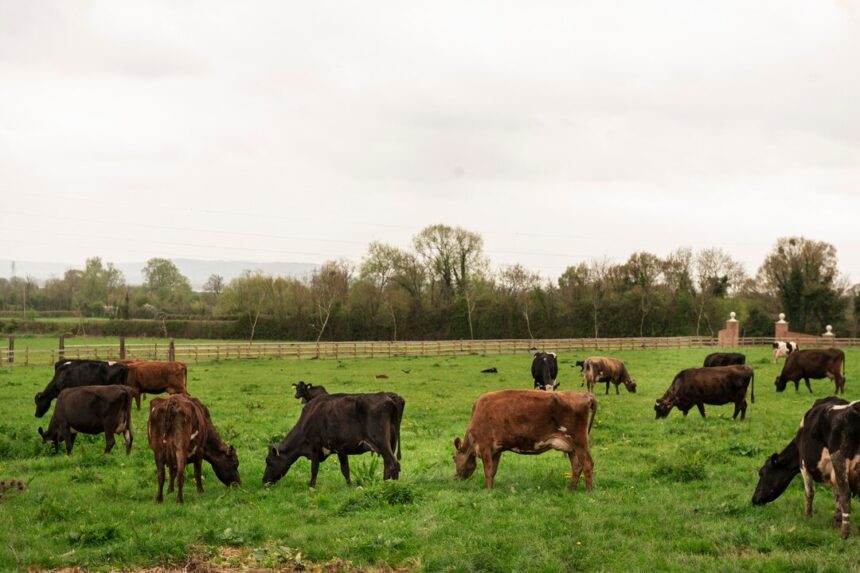Pasture-raised livestock, also known as grass-fed or free-range animals, are raised in natural outdoor environments where they have access to pasture and forage. This traditional method of animal husbandry contrasts with confined feeding operations where animals are raised in crowded feedlots. While pasture-raised livestock require more land and time to reach market weight, they offer numerous benefits for animals, consumers, and the environment. Here are some of the key advantages of pasture-raised livestock:
1. Improved Animal Welfare:
- Pasture-raised livestock have the freedom to roam and exhibit natural behaviors, leading to improved overall welfare compared to animals confined in feedlots. They have access to fresh air, sunlight, and open spaces, which can reduce stress and promote healthier, happier animals.
2. Nutrient-Dense Meat and Dairy:
- Livestock raised on pasture diets tend to produce meat and dairy products that are higher in essential nutrients such as omega-3 fatty acids, vitamins, and minerals. Grass-fed meat is often leaner and has a healthier fat profile than conventionally raised meat, making it a nutritious choice for consumers.
3. Enhanced Flavor and Quality:
- Pasture-raised livestock have a more varied and natural diet, which can result in meat and dairy products with superior flavor, texture, and tenderness. Grass-fed beef, for example, is prized for its rich, beefy flavor and succulent taste, appealing to discerning consumers and chefs alike.
4. Environmental Sustainability:
- Pasture-raised livestock farming practices are generally more environmentally sustainable than intensive feedlot operations. Grazing animals help maintain healthy grasslands, sequester carbon in the soil, and reduce the need for synthetic fertilizers and pesticides. Well-managed pasture systems can also improve soil health and water quality.
5. Reduced Antibiotic Use:
- Pasture-raised livestock are less susceptible to diseases and infections due to their outdoor living conditions and lower stocking densities. As a result, they require fewer antibiotics and veterinary interventions compared to animals raised in confinement, reducing the risk of antibiotic resistance and promoting animal health.
6. Support for Local Economies:
- Pasture-based livestock farming can benefit local economies by supporting small-scale farmers and rural communities. By purchasing pasture-raised meat and dairy products from local producers, consumers can contribute to the economic vitality of their region and promote sustainable agriculture practices.
7. Biodiversity Conservation:
- Well-managed pasture systems can enhance biodiversity by providing habitat for native plants and wildlife species. Grazing animals help maintain diverse grassland ecosystems, supporting pollinators, birds, and other beneficial organisms that contribute to ecosystem health.
8. Ethical and Transparent Farming Practices:
- Pasture-raised livestock farming often prioritizes ethical and transparent farming practices that prioritize animal welfare, environmental stewardship, and consumer transparency. Farmers who raise animals on pasture are more likely to engage with their customers and provide information about their farming methods and sourcing practices.
9. Resilience to Climate Change:
- Pasture-based livestock systems can be more resilient to climate change impacts such as droughts and extreme weather events. Healthy grasslands and diversified pasture ecosystems are better able to withstand environmental stresses and maintain productivity over time.
10. Cultural and Culinary Heritage:
- Pasture-raised livestock farming reflects traditional agricultural practices that have been passed down through generations. By supporting pasture-based agriculture, consumers can connect with their cultural heritage and enjoy the unique flavors and culinary traditions associated with grass-fed meat and dairy products.
In conclusion, pasture-raised livestock offer a host of benefits for animals, consumers, and the environment. From improved animal welfare and nutrient-dense products to environmental sustainability and support for local economies, pasture-based farming practices align with principles of ethical, transparent, and sustainable agriculture. By choosing pasture-raised meat and dairy products, consumers can enjoy delicious, nutritious food while supporting farmers who prioritize animal welfare, environmental stewardship, and community resilience.









